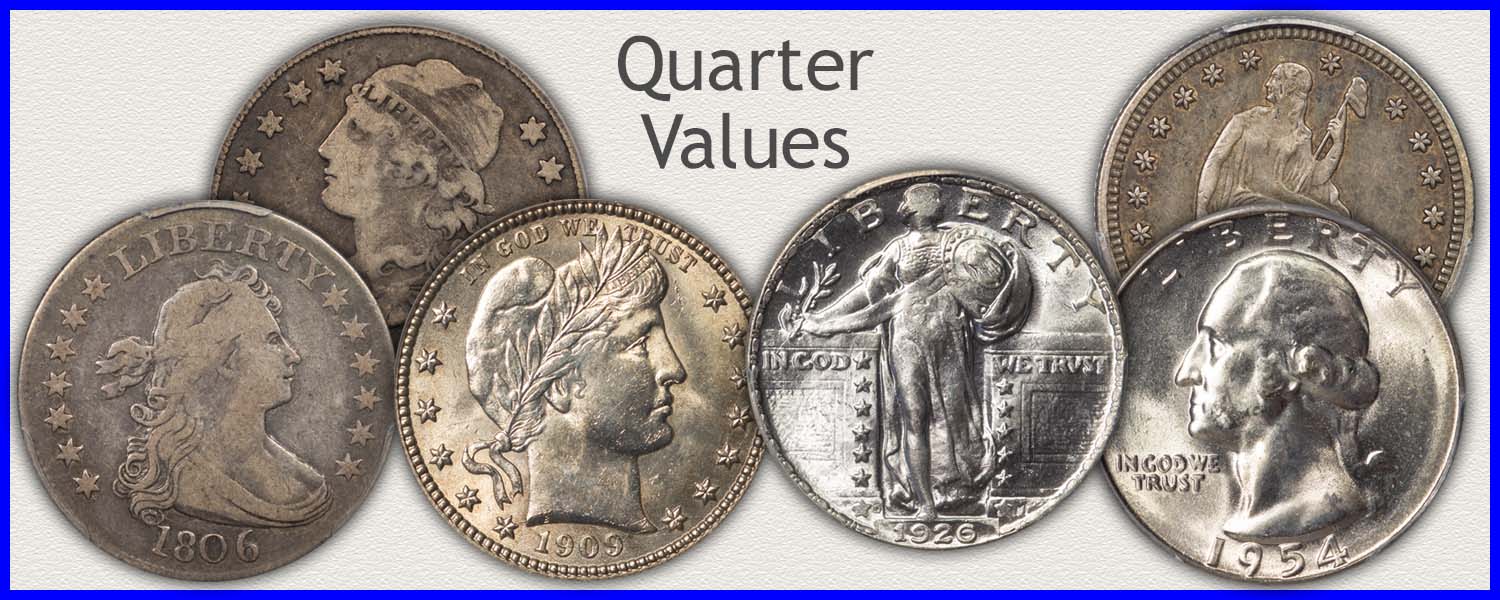Coin Values Moving with Precious Metals: Up-Dated 2/2/2026: Gold $4456 | Silver $72.85
Silver Washington Quarters Value
Your silver Washington quarters value has a base price of $12.24 . With the value of silver in the $72.85 per ounce range, updated 2/2/2026 .
A step by step method is presented to judge collector quality and identify the silver Washington quarters worth more.
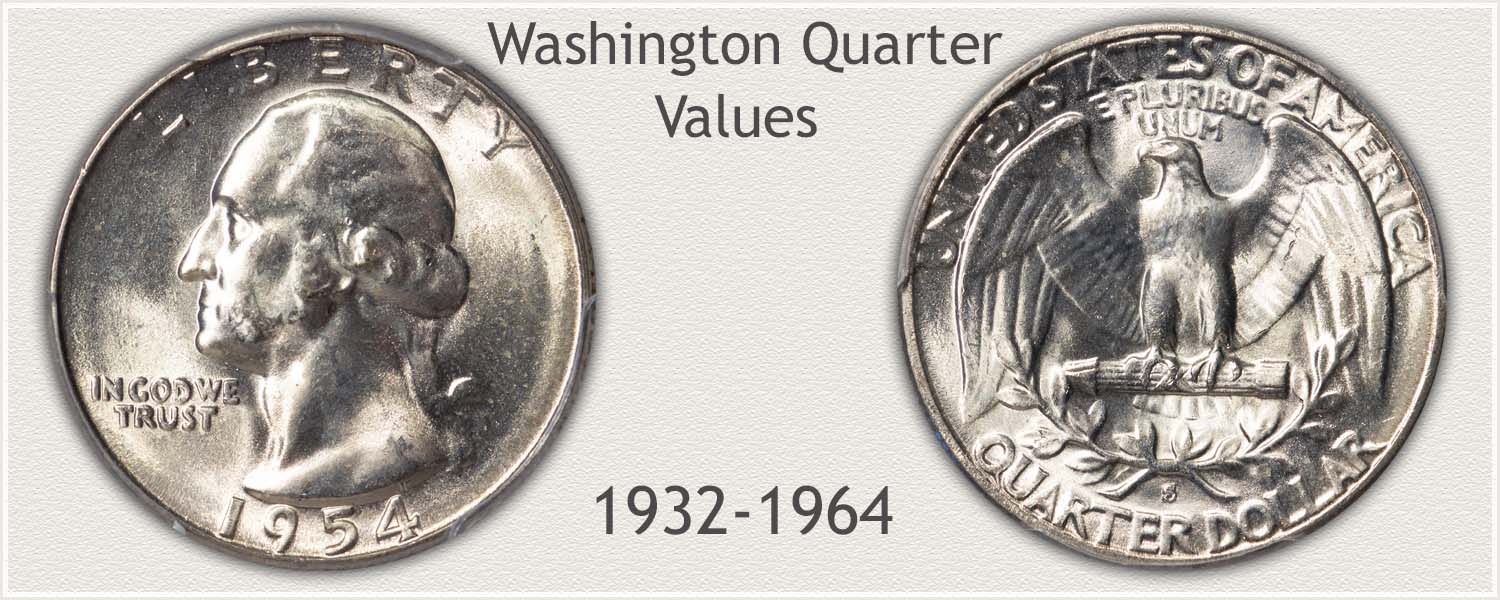
Steps Leading to Value:
- Step 1: Date and Mintmark Variety - Dates hold the key to identify potential value.
- Step 2: Grading Condition - Collectors are in search of high-grade coins. Judge condition comparing to images and video.
- Step 3: Special Qualities - Quickly separate the high demand pieces and recognize the silver potential of all first era Washington quarters.
Washington quarters of the early years are 90% silver forming a solid base and premium over face value. As a collectible; 1932 to 1964 dated quarters (the silver years) are popular with collectors assembling date - mintmark sets.
Notice on the value chart a major dividing line: Washington quarters are worth more in mint state condition by the largest margin. Additionally, certain dates are beginning to develop premiums in circulated condition. Follow the steps to identify your coin.
| Washington Quarters Value 1932 to 1964 | ||||
|---|---|---|---|---|
| Condition of Coin | ||||
| Date | Good | Fine | Extremely Fine | Mint State |
| Washington Quarters Value Updated | 2/2/2026 | |||
| 1932 | $12.24 | $12.24 | $15.83 | $39 |
| 1932 D | $54 | $71 | $168 | $806 |
| 1932 S | $48 | $68 | $98 | $315 |
| 1934 | $12.24 | $12.24 | $15.83 | $35 |
| 1934 D | $12.24 | $12.24 | $41 | $183 |
| 1935 | $12.24 | $12.24 | $14.63 | $28 |
| 1935 D | $12.24 | $12.24 | $56 | $210 |
| 1935 S | $12.24 | $12.24 | $20.61 | $77 |
| 1936 | $12.24 | $12.24 | $13.74 | $34 |
| 1936 D | $12.24 | $12.24 | $50 | $387 |
| 1936 S | $12.24 | $12.24 | $19 | $103 |
| 1937 | $12.24 | $12.24 | $14.63 | $32 |
| 1937 D | $12.24 | $12.24 | $23 | $77 |
| 1937 S | $12.24 | $12.24 | $30 | $150 |
| 1938 | $12.24 | $12.24 | $20 | $72 |
| 1938 S | $12.24 | $12.24 | $23 | $75 |
| 1939 | $12.24 | $12.24 | $13.74 | $24.85 |
| 1939 D | $12.24 | $12.24 | $20.61 | $46 |
| 1939 S | $12.24 | $12.24 | $32 | $119 |
| 1940 | $12.24 | $12.24 | $13.74 | $28 |
| 1940 D | $12.24 | $12.24 | $40 | $113 |
| 1940 S | $12.24 | $12.24 | $14.63 | $34 |
| 1941 | $12.24 | $12.24 | $12.99 | $17.50 |
| 1941 D | $12.24 | $12.24 | $14.63 | $45 |
| 1941 S | $12.24 | $12.24 | $14.63 | $38 |
| 1942 | $12.24 | $12.24 | $12.24 | $15.62 |
| 1942 D | $12.24 | $12.24 | $14.63 | $23 |
| 1942 S | $12.24 | $12.24 | $20.61 | $60 |
| 1943 | $12.24 | $12.24 | $12.99 | $16.26 |
| 1943 D | $12.24 | $12.24 | $15.83 | $34 |
| 1943 S | $12.24 | $12.24 | $15.83 | $35 |
| 1944 | $12.24 | $12.24 | $12.99 | $16.26 |
| 1944 D | $12.24 | $12.24 | $13.74 | $20 |
| 1944 S | $12.24 | $12.24 | $12.99 | $24.85 |
| 1945 | $12.24 | $12.24 | $12.99 | $16.26 |
| 1945 D | $12.24 | $12.24 | $12.99 | $21 |
| 1945 S | $12.24 | $12.24 | $12.24 | $16.88 |
| 1946 | $12.24 | $12.24 | $12.24 | $15.62 |
| 1946 D | $12.24 | $12.24 | $12.24 | $17.50 |
| 1946 S | $12.24 | $12.24 | $12.24 | $16.26 |
| 1947 | $12.24 | $12.24 | $12.24 | $19.38 |
| 1947 D | $12.24 | $12.24 | $12.24 | $17.50 |
| 1947 S | $12.24 | $12.24 | $12.24 | $16.26 |
| 1948 | $12.24 | $12.24 | $12.24 | $15.62 |
| 1948 D | $12.24 | $12.24 | $12.24 | $19.38 |
| 1948 S | $12.24 | $12.24 | $12.99 | $16.88 |
| 1949 | $12.24 | $12.24 | $15.83 | $35 |
| 1949 D | $12.24 | $12.24 | $13.74 | $30 |
| 1950 | $12.24 | $12.24 | $12.24 | $19.38 |
| 1950 D | $12.24 | $12.24 | $12.24 | $16.88 |
| 1950 S | $12.24 | $12.24 | $12.24 | $19.38 |
| 1951 | $12.24 | $12.24 | $12.24 | $15.62 |
| 1951 D | $12.24 | $12.24 | $12.24 | $16.26 |
| 1951 S | $12.24 | $12.24 | $12.24 | $16.88 |
| 1952 | $12.24 | $12.24 | $12.24 | $16.26 |
| 1952 D | $12.24 | $12.24 | $12.24 | $16.26 |
| 1952 S | $12.24 | $12.24 | $12.24 | $19.38 |
| 1953 | $12.24 | $12.24 | $12.24 | $15.62 |
| 1953 D | $12.24 | $12.24 | $12.24 | $16.26 |
| 1953 S | $12.24 | $12.24 | $12.24 | $16.26 |
| 1954 | $12.24 | $12.24 | $12.24 | $15.62 |
| 1954 D | $12.24 | $12.24 | $12.24 | $16.26 |
| 1954 S | $12.24 | $12.24 | $12.24 | $16.26 |
| 1955 | $12.24 | $12.24 | $12.24 | $15.62 |
| 1955 D | $12.24 | $12.24 | $12.24 | $15.62 |
| 1956 | $12.24 | $12.24 | $12.24 | $15.62 |
| 1956 D | $12.24 | $12.24 | $12.24 | $15.62 |
| 1957 | $12.24 | $12.24 | $12.24 | $15.62 |
| 1957 D | $12.24 | $12.24 | $12.24 | $15.62 |
| 1958 | $12.24 | $12.24 | $12.24 | $15.62 |
| 1958 D | $12.24 | $12.24 | $12.24 | $15.62 |
| 1959 | $12.24 | $12.24 | $12.24 | $15.62 |
| 1959 D | $12.24 | $12.24 | $12.24 | $15.62 |
| 1960 | $12.24 | $12.24 | $12.24 | $15.62 |
| 1960 D | $12.24 | $12.24 | $12.24 | $15.62 |
| 1961 | $12.24 | $12.24 | $12.24 | $15.62 |
| 1961 D | $12.24 | $12.24 | $12.24 | $15.62 |
| 1962 | $12.24 | $12.24 | $12.24 | $15.62 |
| 1962 D | $12.24 | $12.24 | $12.24 | $15.62 |
| 1963 | $12.24 | $12.24 | $12.24 | $15.62 |
| 1963 D | $12.24 | $12.24 | $12.24 | $15.62 |
| 1964 | $12.24 | $12.24 | $12.24 | $15.62 |
| 1964 D | $12.24 | $12.24 | $12.24 | $15.62 |
The above are wholesale Washington quarters value. Computed from dealer's price lists with various mark-up factors figured in. They reflect closely the value you would expect to receive when selling.
You can expect variations in value to occur subject to subtle grading points, collector demands and dealer needs.
Step 1: | Date and Mintmark are Identified
After a lapse of production in 1931 a new Washington quarter was introduced in 1932 the bicentennial of Washington's birth. The obverse is filled with the bust of George Washington with softly detailed hair tied in the back. A reverse is of an eagle wings outspread standing on a bundle of arrows - symbolic of strength and resolve with two olive branches below - peaceful intensions.
Mints and Mintmarks of the Silver Washington Quarter Series
First era Washington quarters; 1932 to 1964 are 90% silver and a popular variety of the series with collectors. Availability of all dates and mintmark combinations attracts both new and advanced collectors with sets assembled in many grades of condition. Mint state coins attract the most attention and are worth in line with initial mintage numbers. Identity of mintmarks narrows the range of how much these silver quarters are worth.
San Francisco Mint
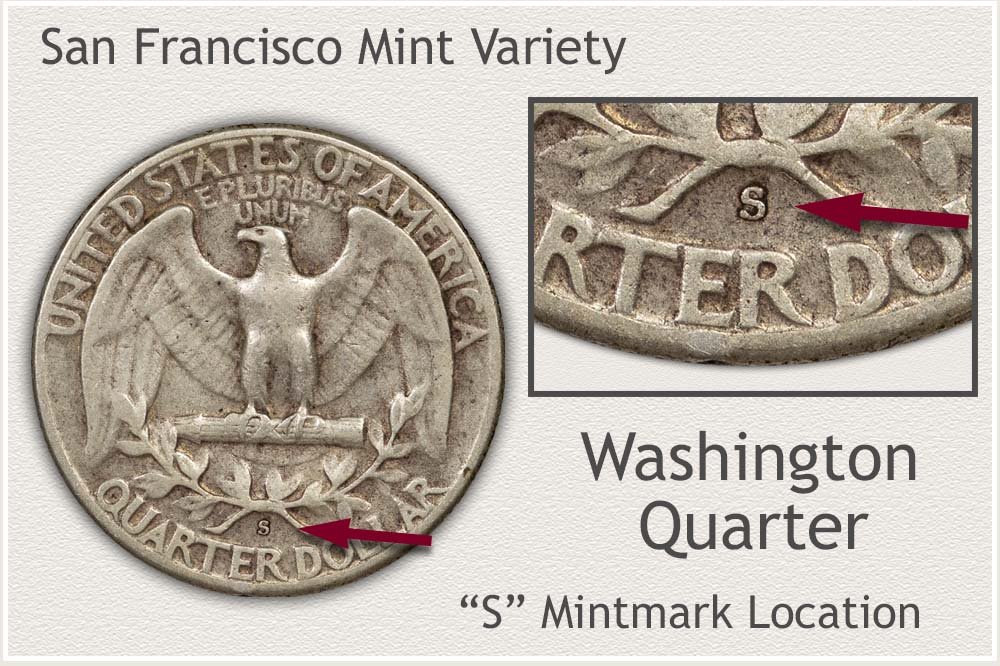
San Francisco was part of the initial minting of the New Washington quarter. It holds the distinction of the fewest variety of any year, striking 408,000 pieces in 1932. A remarkably low number when compared to later number in the tens of millions of coins. All early "S" mintmark Washington quarter are worth a close look as to condition.
Find the "S" mintmark on the reverse just below where the olive branches meet.
Denver Mint
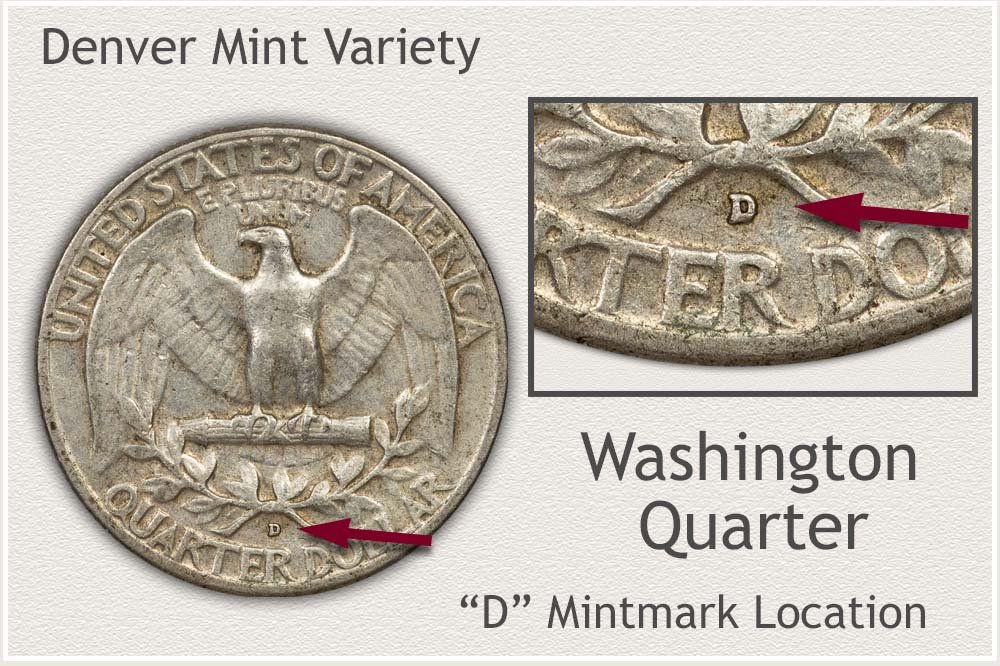
Noted as minting the largest number of silver Washington quarters in any one year - 1964, Denver struck over 1.7 quarters dating from 1932 to 1964. No mints produced quarters in 1933 and Denver only missed one other year 1938. Denver's lowest mintage year was 1932 436,000 followed by 1955. Although 1955 is not a premium coin its low mintage is well known by collectors.
A "D" mintmark was placed on the reverse just below where the olive branches, above the "ER".
Philadelphia Mint
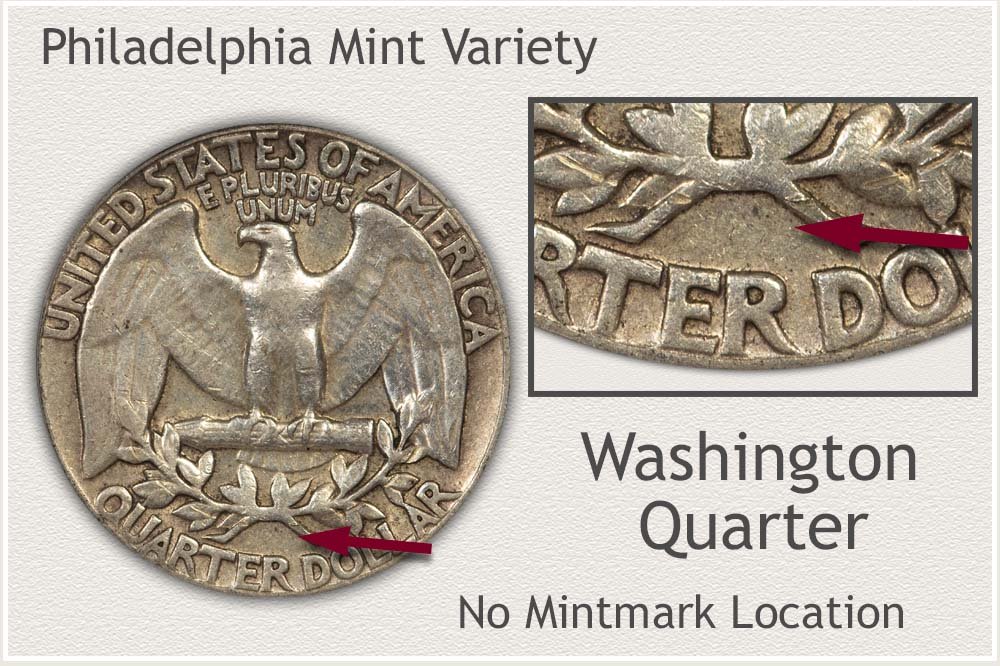
Philadelphia is the main US mint, striking "circulating" coinage and proof coins. Production of the silver Washington quarter era dates from 1932 to 1964. Missing only one year - 1933; Philadelphia struck 1.8 bullion silver quarters. A date run of Philadelphia silver quarters is an interesting and affordable collection of silver coins.
No mintmark was used by Philadelphia on coinage during the early Washington quarters era. Look on the reverse in the space above "ER" and below the olive branches, if no mintmark, Philadelphia struck the coin.
Step 2: | Grading Condition | Identify Collector Grade
The condition or state of preservation has a large impact on Washington quarters value. A heavily worn "Good" condition coin - if a key date - has appeal to collectors. Also; always desirable are examples in Mint State - brand new - condition. Top values are found in the upper grade quarters.
To determine your Washington quarters value, compare your coins to the grading images below. Separate out the well-worn coins, then assign a grade to your nicer coins. After this you are ready to check the coin values chart.
Washington Quarters Value is Conditional
As you grade your quarters, focus your attention on the rim of the coin. A full rim and some hair detail on Washington separate a coin in "Fine" condition from one in the lower "Good" condition. A coin with sharp detail, only traces of wear, and some mint luster approaches the "Mint State" grade. These coins have the potential of higher collectible value.
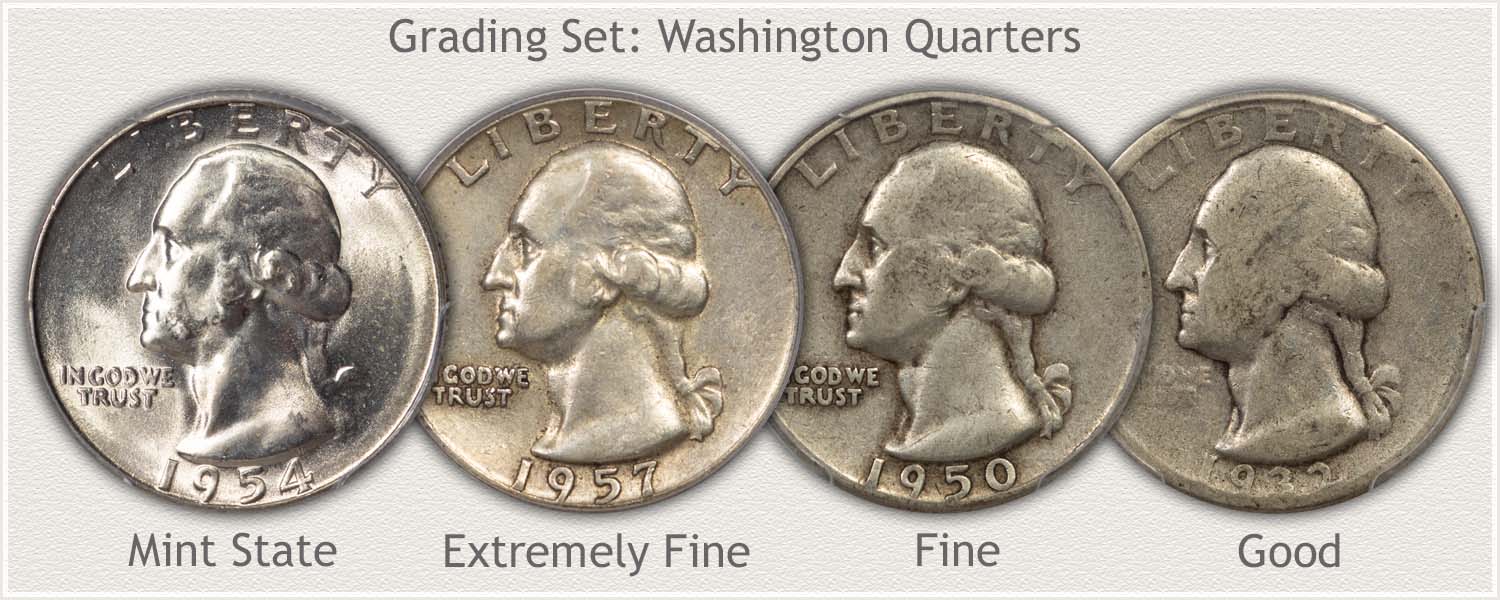
Mint State Grade: Washington Quarter
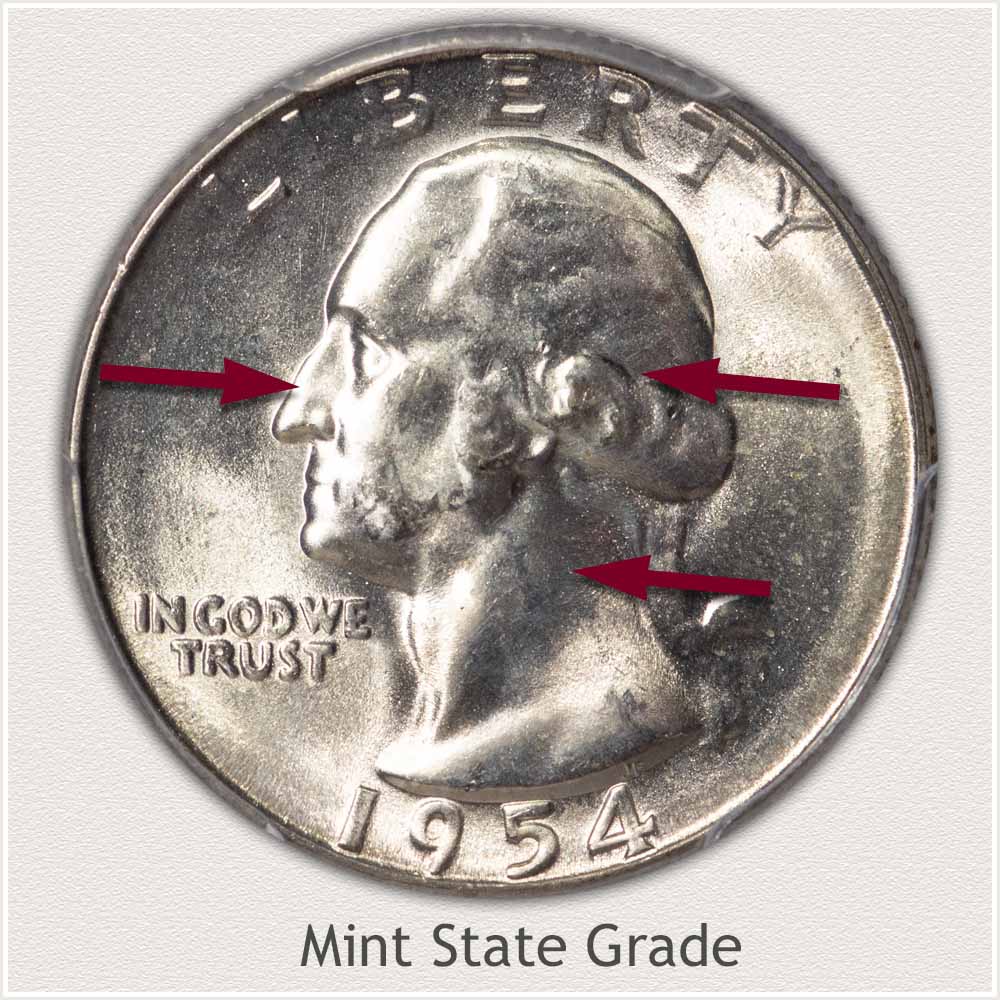
Obverse: Features Identifying Mint State Grade: A coin never handled through circulation remains with original surfaces. Mint luster is intact over the entire surface of a Mint State quarter.
No trace of wear is seen on the raised cheek area just under Washington's eye. Luster, a fine texture to the metal is complete over the cheek.
High profile points are above the ear and just behind. Both areas are without any smoothing to the metal or dulling of color.
On Washington's neck below the ear and to the shoulder is a raised feature. In Mint State condition the texture of the neck is consistent over high and low areas.
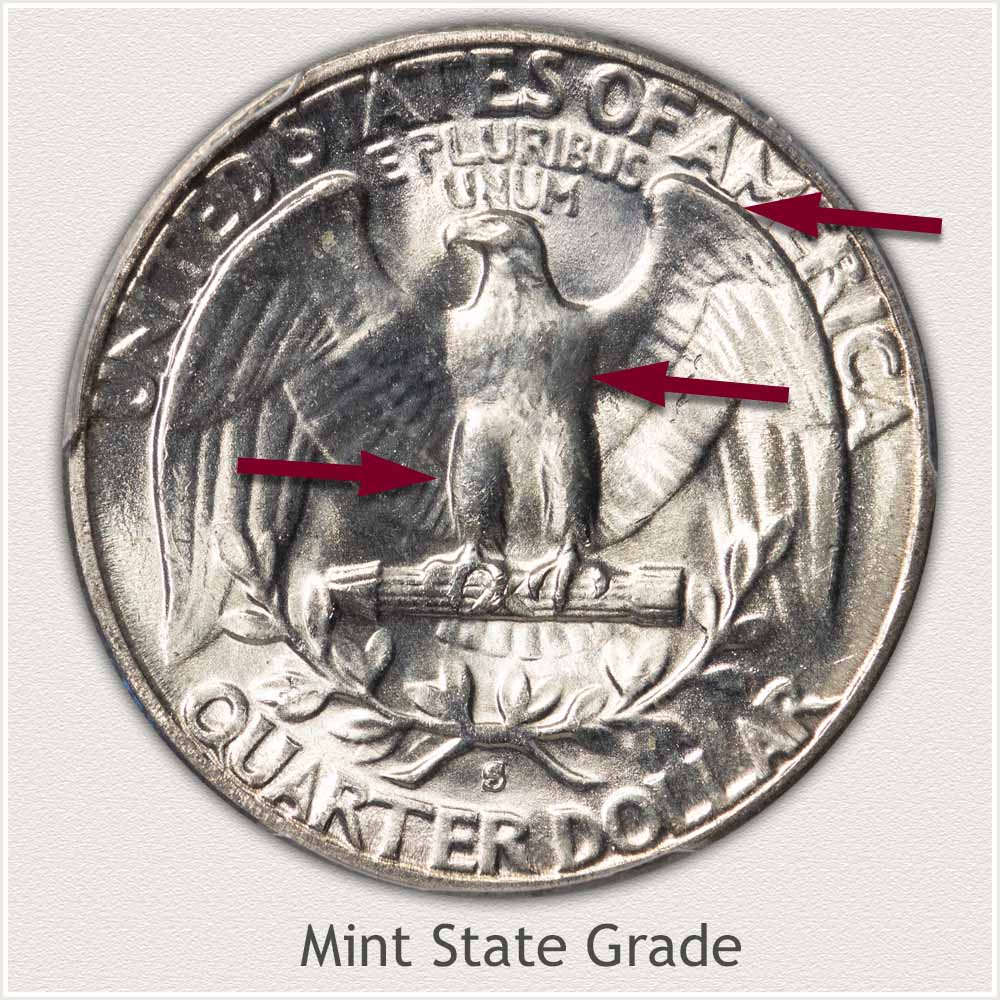
Reverse: Features Identifying Mint State Grade: High relief areas are inspected carefully to detect smoothing due to wear.
Outstretched wings have a high ridge extending from the shoulders of the eagle to tips of the wing. Any wear along this contour shows as a different color to the metal and smoother texture than the rest of the wing.
No loss of detail is seen on the center chest of the eagle. Texture of original luster remains.
High points of legs are without signs of wear. No smoothing to the metal is evident.
Extremely Fine Grade: Washington Quarter
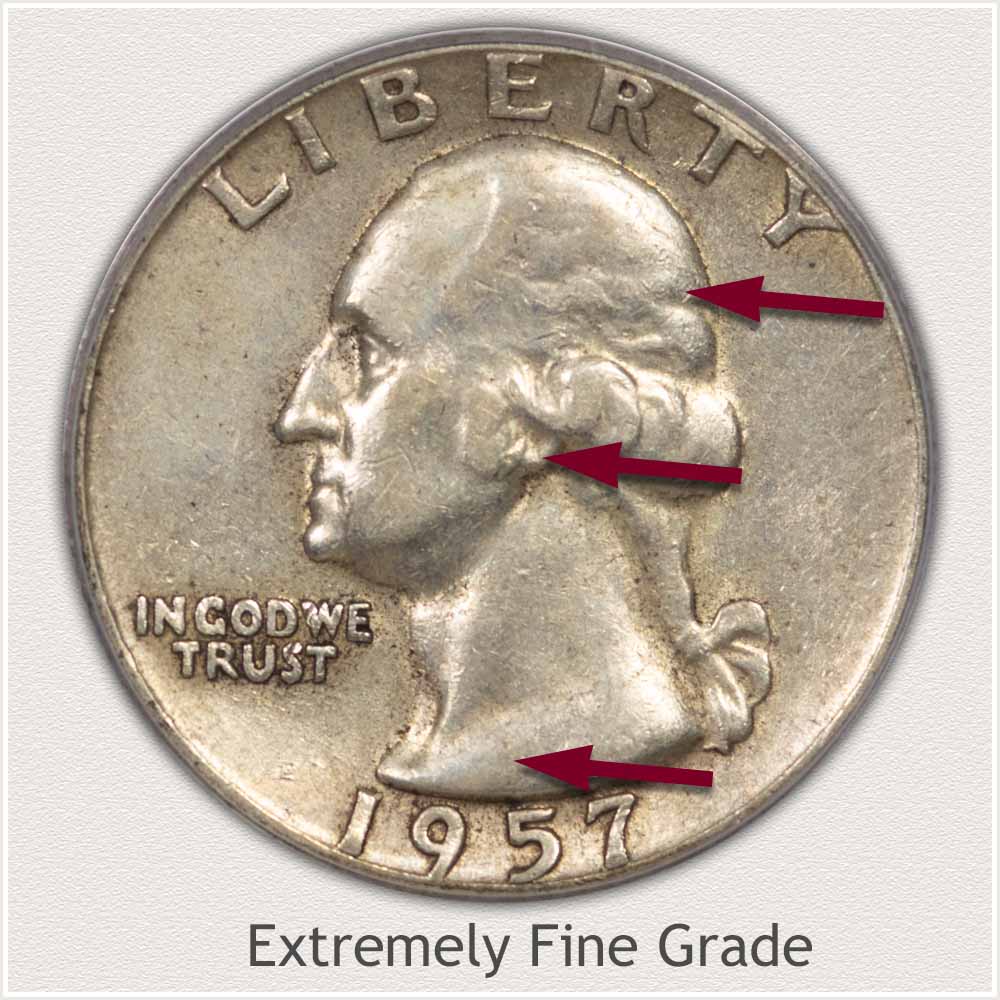
Obverse: Features Identifying Extremely Fine Grade: Light wear is evident on the high areas in the Extremely Fine grade.
Just in front of the ear a small flat area has developed. Over Washington's ear the small wave of hair is flat on top and this flatness continues to the curl behind the ear. Note: Just the tops of hair detail is flattened.
Waves in Washington's hair towards the top are lightly worn with the major waves bold.
The neck area above the date is showing slight smoothing. Also, the raised area of Washington's neckline is smooth and beginning to lose contour.
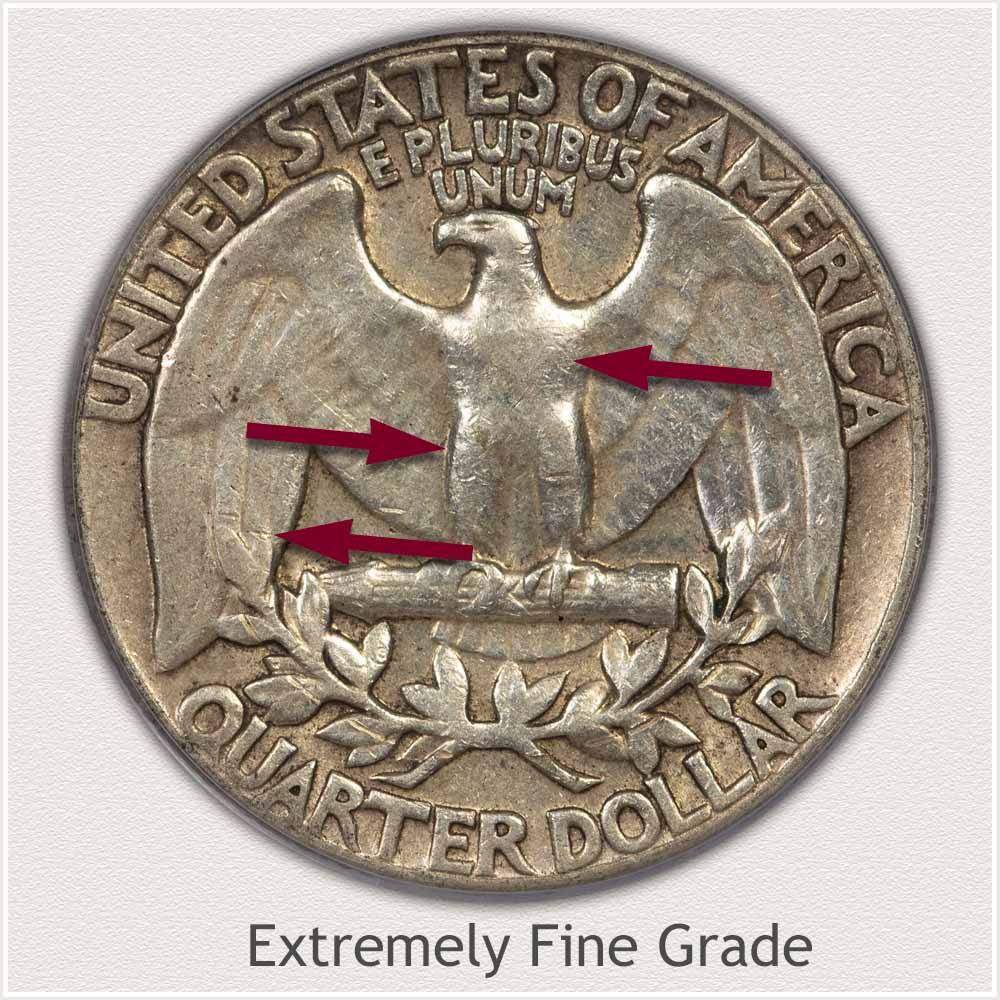
Reverse: Features Identifying Extremely Fine Grade: Slight wear has removed a few fine details to the reverse eagle;
Feather details on the Eagle's chest are no longer visible. These fine feather lines where never bold to begin. Chest remains well rounded.
Details to leg feathers are now missing on the tops of legs. A smooth spot has replaced feathers on the tops of legs with roundness remaining to the rest of the legs.
Olive leaves where they lay over the tips of wings remain bold and raised.
Fine Grade: Washington Quarter
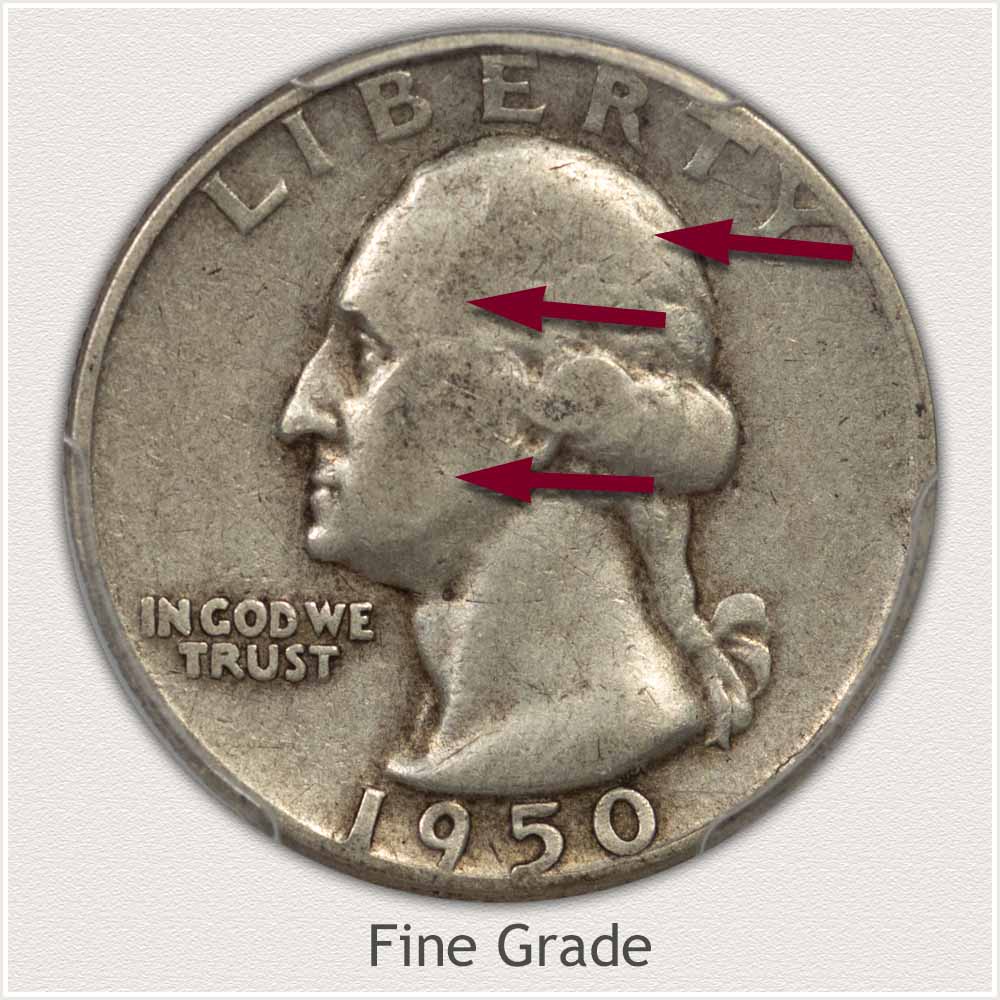
Obverse: Features Identifying the Fine Grade: Flat areas now cover many parts of Washington's portrait.
Hair detail is mostly smooth through the top of his head. Some deeper lines remain above the large curl at the back.
A faint separation is visible defining the cheek, temple, and forehead from the hair.
Washington cheek and jaw are flat. A small contour separating the two is now missing.
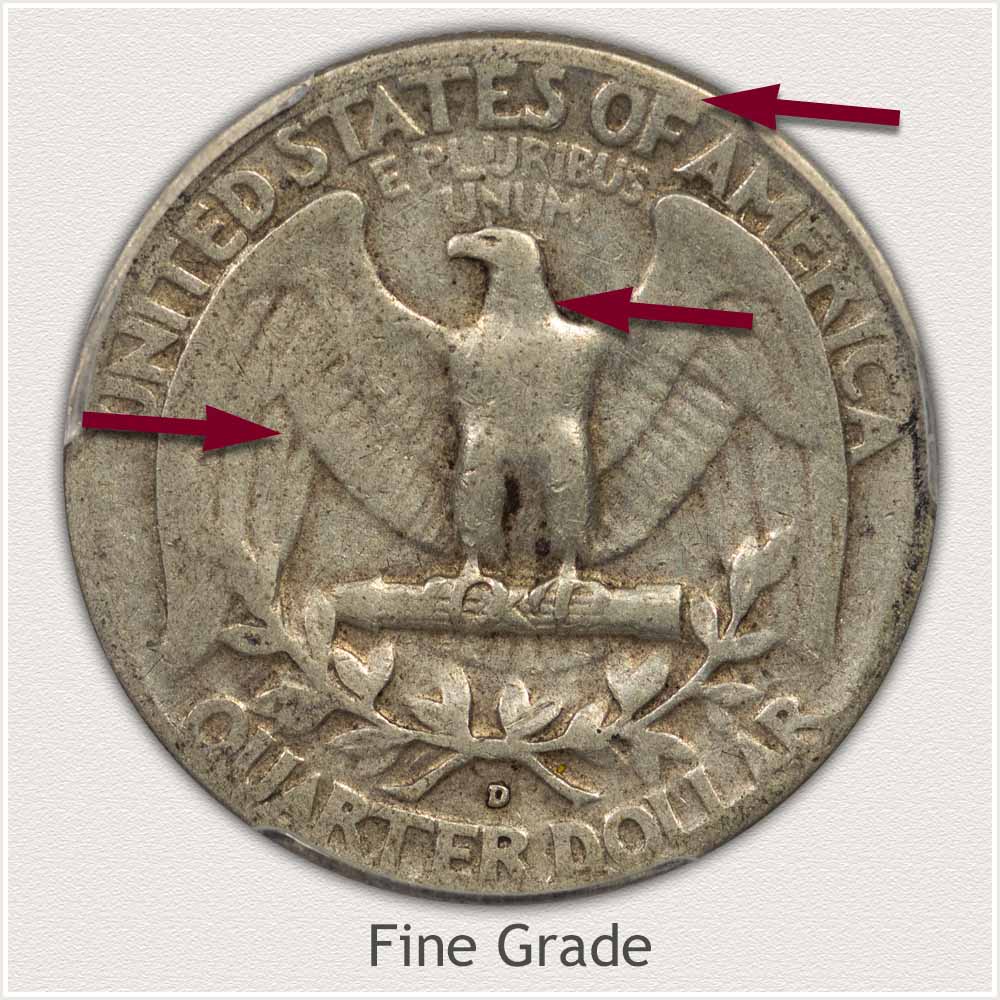
Reverse: Features Identifying the Fine Grade: Moderate wear has begun to give the eagle a "faded" look.
A large flat area connects the Eagle's head, running through the chest and legs.
Most feathers are separated within the wings but lines are soft and faded.
Letters are beginning to merge with the rim in places. All remain readable.
Good Grade: Washington Quarter
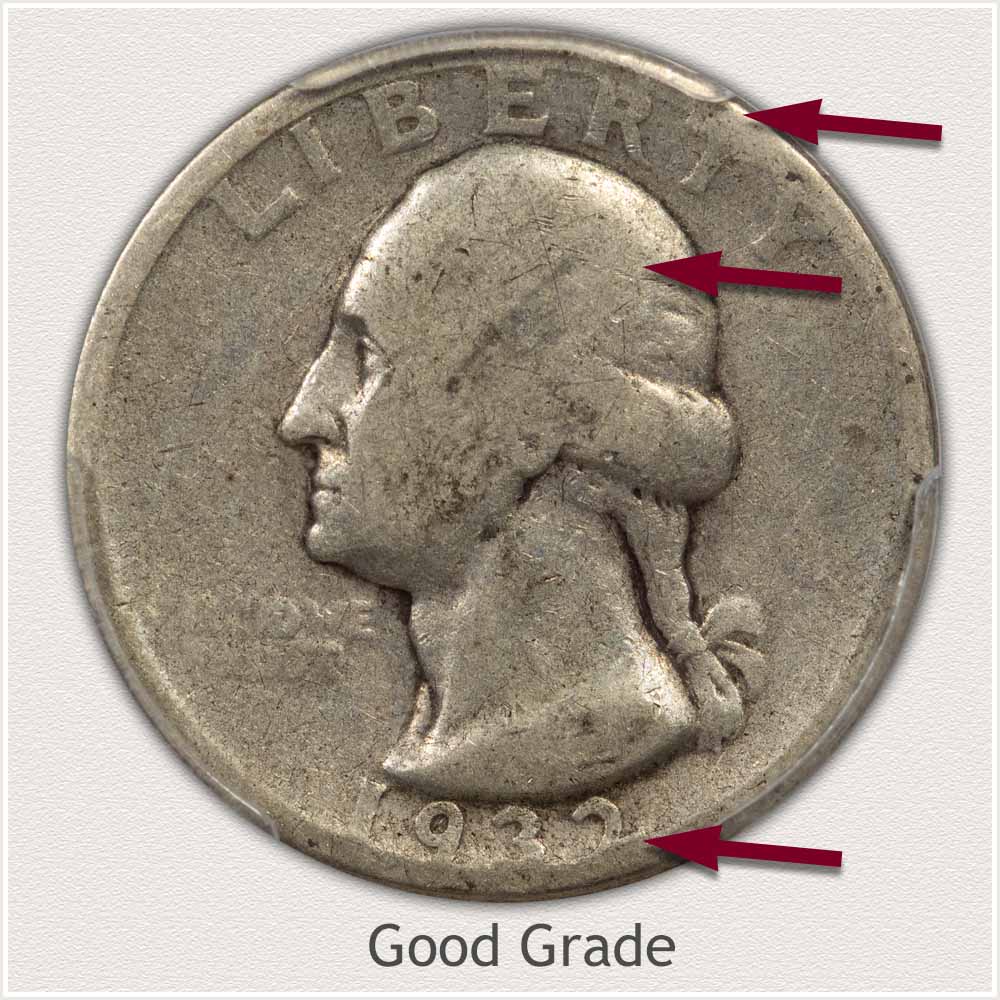
Obverse: Features Identifying the Good Grade: Washington portrait remains bold and raised from the field.
Most hair detail is missing and a smooth flat area connects Washington's face with hair.
Letters of "Liberty" are readable but are connected with the rim.
Date is clear and readable but is also connected with the rim.
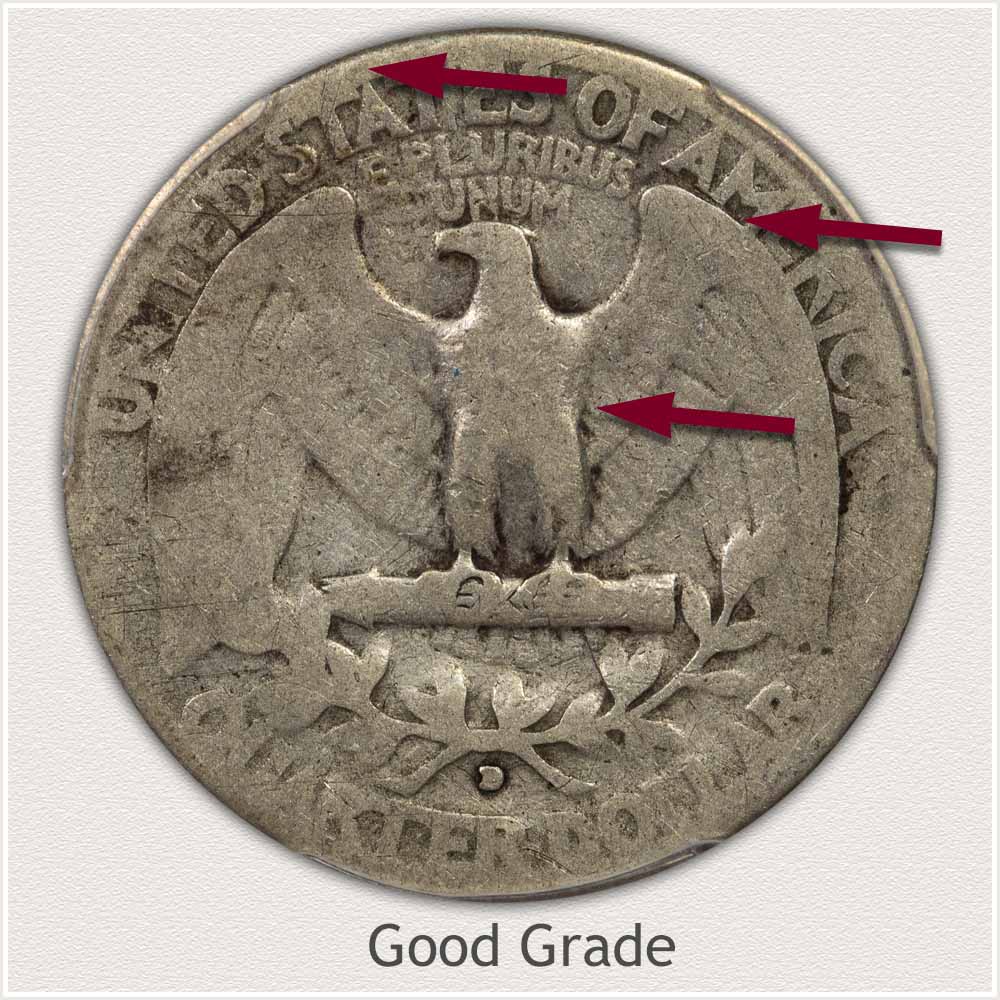
Reverse: Features Identifying the Good Grade: Many feather details to the center of the wings remain.
The eagle is very flat, however, a full outline to the wings is complete.
Center of the eagle is one flat area.
Legend is merging with the rim at tops of letters. Many letters are often weak but must remain readable.
How To Video: Grading Washington Quarters
Washington Quarters: Of importance to grading Washington quarters is identifying and separating the minimum silver value examples from the higher collector quality coins. Video plus close-up images and detailed descriptions help judge condition and assign a grade.
Ho to Video | Grading Washington Quarters
Step 3: | Special Qualities | Bullion to Collector Quarters
As of 2/2/2026 all silver Washington quarters are worth $12.24 . A nice minimum value. Collector demand is the base to any coin rising above this bullion level. Many date and mintmark combination have potential to collector level demand.
Silver Washington Quarters Value is Developing
Condition of the coin is the first consideration to higher value. The Extremely Fine grade is noted on the chart as a key grade separating bullion from collector quality. View closely the subtle difference in preservation of the major and minor design elements seen on the Extremely Fine grade coin.
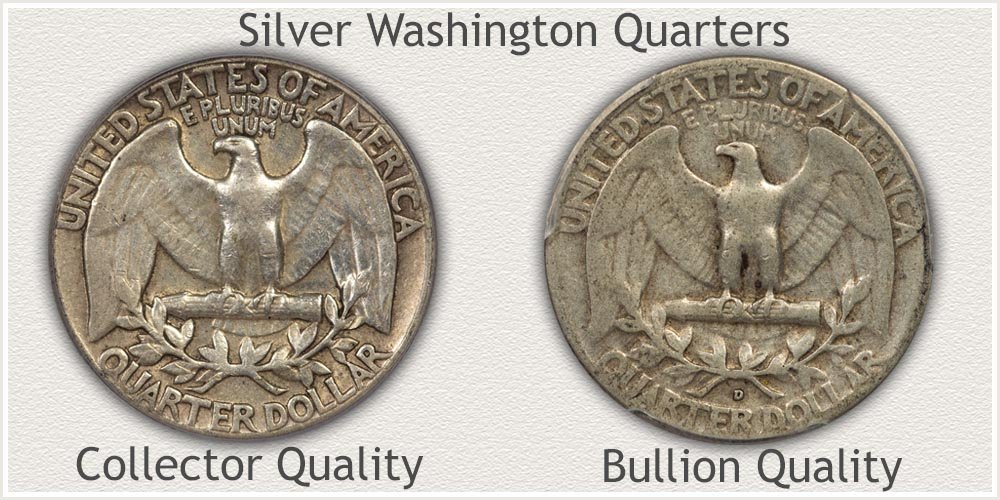
When compared to an Extremely Fine example, the Fine Grade coin lacks a "crisp" appearance and suffers from a "quality" standpoint. Both grades are affordable in most dates and a strong preference is given to the high-quality example by collectors.
Dates to examine closely are all early years, these are becoming very old. Look over any dated 1932 to 1945. Set aside the higher grade Extremely Fine examples, do not include these as bullion quality. To meet the desires of future collectors; all have a strong potential to rise above "common" statis. Early quarters with "D" and "S" mintmarks are typically low mintage varieties and desirable coins.
Earlier dates and high condition. This one-two combination is what gives Washington quarters value. Sort through all your quarters, pull out the nice ones and discover how much they are worth.
References
US Mint. 1931 US Mint Annual Report.
https://nnp.wustl.edu/library/book/514135
US Mint. Symbols on Our Coins.
https://www.usmint.gov/learn/history/us-circulating-coins
US Mint. 1964 US Mint Annual Report.
https://nnp.wustl.edu/library/book/514149
US Treasury. Annual Report Secretary of the Treasury 1958.
https://fraser.stlouisfed.org/title/194/item/5451
Coin Values | CoinStudy Articles
Coin Value Guide | How to Value a Coin Collection
A step by step method combined with the coin value online guide identifies how to value a coin collection. Discover how much your box of old coins is worth.
Easily find how much your old coins are worth. From Bust Quarters to Seated Liberty, Barber, Standing Liberty and Washington quarters. All series include Grading Images to judge the condition of your coins and coin value charts.
Scarce and rare quarters are found in all the design series. Early era quarters, 1796 to the 1890's are all scarce. Quarters of the twentieth century are very popular today, with certain key dates considered rare.
Today's Minimum Silver Coin Values
Old US silver coin values rise and fall with the price of silver. Silver dimes, quarters, half dollars and silver dollars are all heavy with 90% silver and worth many times their face value. With today's high value of silver your old coins are becoming surprisingly valuable.
A quick reference to US Coin Values. Images to identify each coin and minimum values for each type. Using the step by step method to how much coins are worth. Bookmark the online value charts to phone.
Follow the steps to sell silver coins. Determine value first; then how to find a dealer. Images and descriptions help recognize the dates and series US coins contained silver.
★ Coin Values Discovery finds Washington Quarters Value and...
All old US coin values. It is an excellent index with images and text links to all coin series, from Cents to Gold. Value charts, grading images and a step by step procedure uncovers how much your box of old coins is worth.
Print the Coin Values Worksheet to list your Washington quarters and record their values. Should you decide to sell... use the worksheet as an invoice and packing slip when sending coins through the mail to dealers. It indicates you have done your coin values homework.
